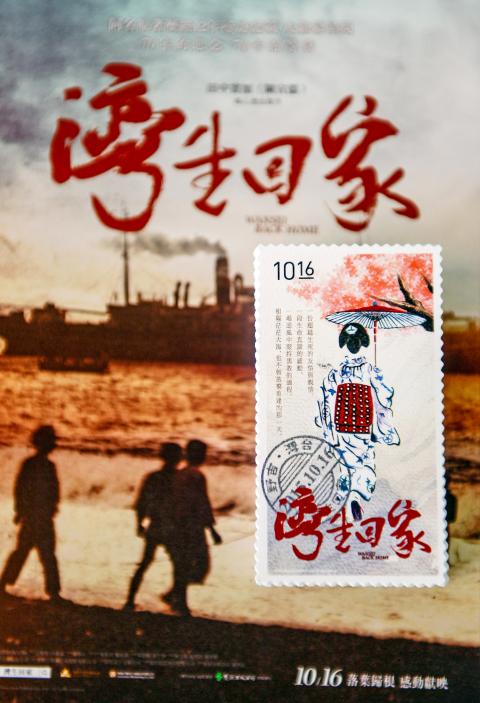In 1895, the Qing dynasty signed the treaty of Shimonoseki and ceded Taiwan to Japan. After World War II ended, the Chinese Nationalist Party (KMT) took over Taiwan and repatriated Japanese nationals to Japan in 1946. Japanese born in Taiwan during those 51 years are called wansei — born in Taiwan.
After Japan surrendered, Japanese in Taiwan could only take carry-on luggage and 1,000 Japanese yen with them on the ships that took them back to Japan. Upon arrival, they were quarantined, and some were infected with diseases and died. After passing the quarantine, they were placed in “Taiwan villages” in a remote mountain area. They suffered from grave discrimination and some have been reluctant to reveal their wansei identity until this day, for fear of affecting their offspring.
Some Japanese chose to stay in Taiwan. Fearing that their identity would be discovered and they would be repatriated, they took Taiwanese names. They dared not speak, lest people would take note of their accent, so people thought they were mute. Even their offspring did not know that they were in fact Japanese.

Photo provided by Activator Marketing Company
照片:牽猴子提供
Film producer Mika Tanaka’s grandmother was a wansei. Since her childhood, Tanaka wondered why her grandmother and the housekeeper couple were so mesmerized by Taiwan. After the three elders passed away, their final wish was to have their ashes scattered in their hometown, Hualien Port, and this prompted Tanaka to start researching wansei stories in 2003. She says, “We hope that this documentary not only gives an account of some old people’s love for Taiwan, but also offers the audience a kind of value system. You will find different answers to many issues when you look at them from a different perspective. Like what those wansei have said, ‘Taiwan is so fantastic, why do you, who are in Taiwan, not hold it dear?‘”
Taipei Mayor Ko Wen-je was invited to attend a special screening of the film, after which he wrote on his Facebook page, “Taiwan’s history is the stories that took place on this land. It only needs to be truthfully recorded. There is no need for additional interpretations, political packaging or manipulation. Just let people feel for themselves. As far as those wansei are concerned, the place where you were born and lived until you were in your 20s will always be a unique memory and arouse a special emotion in you. Such is the deepest emotion in a person’s heart.”
(Liberty Times, translated by Ethan Zhan)
一八九五年,清廷簽下馬關條約將台灣割給日本。二次世界大戰後,中國國民黨接收台灣,並於1946年將在台灣的日本人遣送回國。這五十一年間在台灣出生的日本人,就是「灣生」。
日本投降後,在台日人只能帶著簡單的行李與一千日圓搭船返鄉。上岸後先被隔離檢疫,有些人因此染病而死。通過檢疫的人被安置在名叫「台灣村」的偏遠山區,飽受歧視。有些人至今不願公開「灣生」身份,怕連累後代。
有些日本人選擇留在台灣,為了怕身分曝光被遣送回國,他們將自己的名字改成台灣名;他們不敢講話,以免曝露口音,還被當成啞巴。就連後代也不知道他們其實是日本人。
監製田中實加的奶奶是灣生,從小她就納悶為何奶奶與管家夫婦這麼「哈台」。三位老人家過世後,遺願要把骨灰灑在故鄉花蓮港,她也從二00三年開始投入灣生研究。她說:「我們希望這部記錄片不只敘述一群老人家對台灣的愛,還希望呈現某種價值觀,很多事情站在第三個角度來看,很多解答都不一樣。就像灣生說的,台灣這麼美好,在台灣的你們,為什麼不好好愛台灣?」
台北市長柯文哲受邀參加《灣生回家》的特映會,看完後在臉書上寫道:「台灣的歷史就是發生在這片土地上的故事,只要忠實地記錄下來,不需要任何特別的解釋,也不用政治包裝、政治操作,只需讓各人去感受就行了。對這些灣生來講,從出生到二十幾歲生活的地方,永遠是一個特殊的印象、一份特殊的感情,這就是人類心底最深沉的感情。」
〔自由時報綜合報導〕

In an effort to fight phone scams, British mobile phone company O2 has introduced Daisy, an AI designed to engage phone con artists in time-wasting conversations. Daisy is portrayed as a kindly British granny, exploiting scammers’ tendency to target the elderly. Her voice, based on a real grandmother’s for authenticity, adds to her credibility in the role. “O2” has distributed several dedicated phone numbers online to direct scammers to Daisy instead of actual customers. When Daisy receives a call, she translates the scammers’ spoken words into text and then responds to them accordingly through a text-to-speech system. Remarkably, Daisy

Bilingual Story is a fictionalized account. 雙語故事部分內容純屬虛構。 Emma had reviewed 41 resumes that morning. While the ATS screened out 288 unqualified, she screened for AI slop. She could spot it a mile away. She muttered AI buzzwords like curses under her breath. “Team player.” “Results-driven.” “Stakeholder alignment.” “Leveraging core competencies.” Each resume reeked of AI modeling: a cemetery of cliches, tombstones of personality. AI wasn’t just changing hiring. It was draining the humanity from it. Then she found it: a plain PDF cover letter. No template. No design flourishes. The first line read: “I once tried to automate my

Every May 1, Hawaii comes alive with Lei Day, a festival celebrating the rich culture and spirit of the islands. Initiated in 1927 by the poet Don Blanding, Lei Day began as a tribute to the Hawaiian custom of making and wearing leis. The idea was quickly adopted and officially recognized as a holiday in 1929, and leis have since become a symbol of local pride and cultural preservation. In Hawaiian culture, leis are more than decorative garlands made from flowers, shells or feathers. For Hawaiians, giving a lei is as natural as saying “aloha.” It shows love and

1. 他走出門,左右看一下,就過了馬路。 ˇ He walked outside, looked left and right, and crossed the road. χ He walked outside and looked left and right, crossed the road. 註︰並列連接詞 and 在這句中連接三個述語。一般的結構是 x, y, and z。x and y and z 是加強語氣的結構,x and y, z 則不可以。 2. 他們知道自己的弱點以及如何趕上其他競爭者。 ˇ They saw where their weak points lay and how they could catch up with the other competitors. χ They saw where their weak points lay and how to catch up with the other competitors. 註:and 一般連接同等成分,結構相等的單詞、片語或子句。誤句中 and 的前面是子句,後面是不定詞片語,不能用 and 連接,必須把不定詞片語改為子句,and 前後的結構才相等。 3. 她坐上計程車,直接到機場。 ˇ She took a cab, which took her straight to the airport. ˇ She took a cab and it took her straight